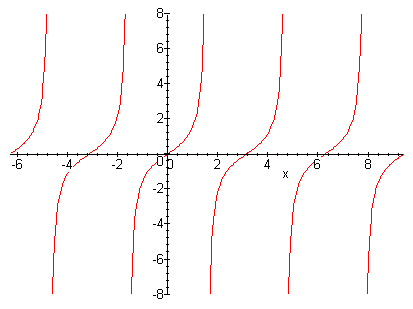| (2 intermediate revisions by one other user not shown) | |||
| Line 1: | Line 1: | ||
| + | =Periodic versus non-periodic functions ([[Homework_1_ECE301Fall2008mboutin|hw1]], [[ECE301]])= | ||
| + | <span style="color:green"> Read the instructor's comments [[hw1periodicECE301f08profcomments|here]]. </span> | ||
| + | |||
A discrete time signal is periodic if there exists T > 0 such that x(t + T) = x(t) | A discrete time signal is periodic if there exists T > 0 such that x(t + T) = x(t) | ||
| Line 5: | Line 8: | ||
==Periodic Signal== | ==Periodic Signal== | ||
| − | Let <math> | + | Let <math>x(t) = tan(t)</math> |
| + | |||
| + | For x(t) to be periodic, the following must hold true: | ||
| + | |||
| + | tan(t) = tan(t + T) for some value of T > 0 | ||
| + | |||
| + | Since we know that tan(t) repeats itself after every period of <math> t = \pi</math> , we know that x(t) is a periodic signal. | ||
| + | |||
| + | [[Image:Tangent_ECE301Fall2008mboutin.gif]] | ||
==Non Periodic Signal== | ==Non Periodic Signal== | ||
Latest revision as of 07:20, 14 April 2010
Periodic versus non-periodic functions (hw1, ECE301)
Read the instructor's comments here.
A discrete time signal is periodic if there exists T > 0 such that x(t + T) = x(t)
A continuous time signal is periodic if there exists some integer N > 0 such that x[n + N] = x[n]
Periodic Signal
Let $ x(t) = tan(t) $
For x(t) to be periodic, the following must hold true:
tan(t) = tan(t + T) for some value of T > 0
Since we know that tan(t) repeats itself after every period of $ t = \pi $ , we know that x(t) is a periodic signal.
Non Periodic Signal
Let $ x[n] = e^{jn} $
For x[n] to be periodic, the following must hold true:
$ e^{jn} = e^{j(n+N)} $ for some integer N
$ e^{jn} = e^{jn} e^{jN} $
$ 1 = e^{jN} $
1 = cos(N) + jsin(N)
This equation only holds true if $ N = 2\pi $ or some multiple of $ 2\pi $
Therefore$ x[n] = e^{jn} $ is not periodic because $ 2\pi $ is not an integer.


